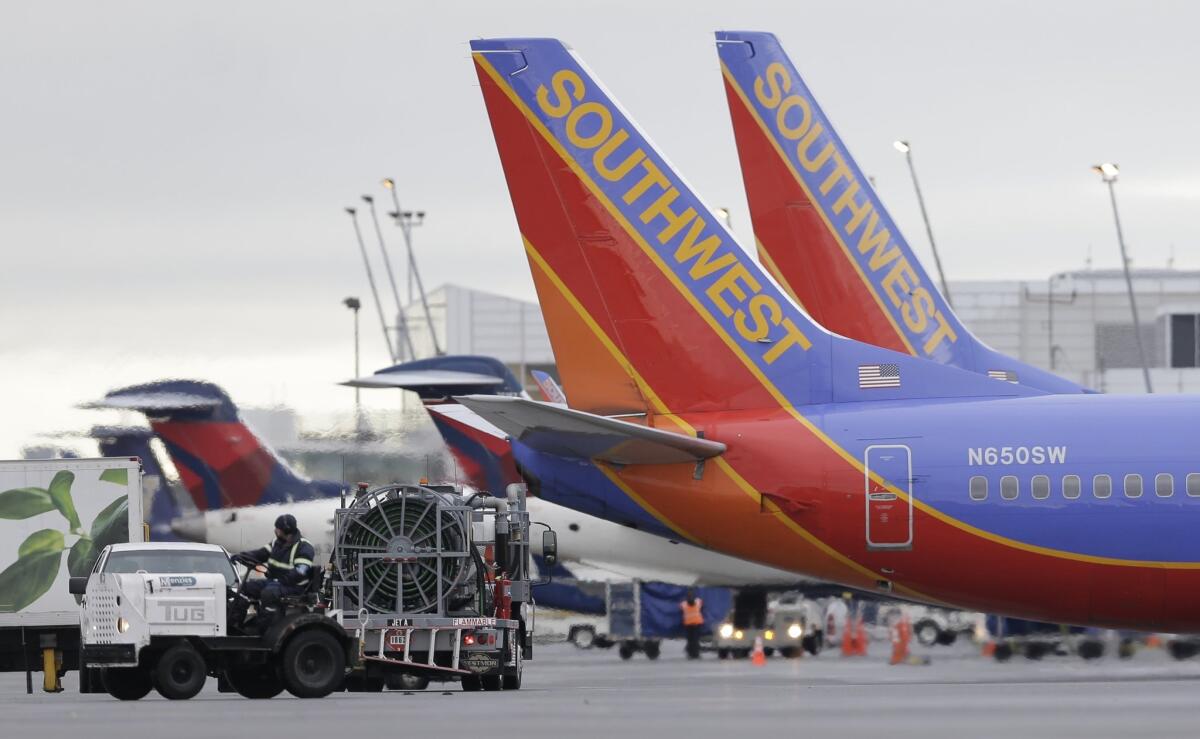Perspective: ‘Inshallah’ is not a crime, so let’s all learn some Arabic

- Share via
Two weeks ago, a UC Berkeley student was kicked off a plane – for speaking Arabic, he says.
Khairuldeen Makhzoomi said in an interview with The Times that he was chatting to his uncle on the phone when he noticed a woman seated in the row ahead staring at him. “This is weird,” he thought to himself. After telling his uncle he’d call him back, he hung up with a quick phrase in Arabic: “inshallah.”
A few minutes later, he said, he was asked why he was speaking Arabic on a plane. Next, he was searched by police, and then FBI agents.
It probably wasn’t the “inshallah” that made everyone nervous (it seems to be the fact that Makhzoomi was speaking Arabic, period), but that word's been on a lot of people's minds today.
RELATED: UC Berkeley student says he was taken off a Southwest flight at LAX for speaking Arabic
So what does “inshallah” mean?
Literally translated, it’s “God willing.” Not exactly scary, unless you harbor some deep-seated resentment toward The Clipse’s first album (in which case, we cannot be friends).
There are plenty of analogues in other languages. The Spanish Ojalá, for example, is borrowed from the Arabic “inshallah”, and has pretty much the same meaning – “God willing,” or more informally, “hopefully."
So, for example, "Ojalá que no me echen de este avión" would mean "I hope they don’t kick me off this plane.” Which, hopefully, is something that nobody would want to happen to any innocent person.
Strictly speaking, “inshallah” is meant to be used seriously, when you genuinely hope that something will come to pass. But a lot of people use it more liberally, almost like punctuation, or even as a joke.
Wajahat Ali, a former host at Al Jazeera America, says he uses “inshallah” at least 40 times a day. He wrote a hilarious post that’s been making the rounds on social media, which details a few common, casual situations that you might hear the word. One example:
Kid: "Dad, let's go to Toys 'R Us today!"
Dad: "Yeah, inshallah" [translation: we are not going.]
A bit more seriously, he told me in an email that by creating a funny post on the word, it "made the medicine of tolerance and education go down a bit easier…inshallah."
Tanzila Ahmed, a host of the podcast Good Muslim, Bad Muslim, has written an essay in a book called “Love, InshAllah: The Secret Love Lives of American Muslim Women.”
"What I love about the book being called that is that it has this tenor of hope to it,” she told me over the phone. "That’s what it’s saying in the title: ‘Love, hopefully.’ That love is meant to happen. I don’t consider myself super orthodox in my spirituality, but that’s the one word I’ll use often. It's a deep word.”
Should everyone start saying “inshallah”?
Tanzila Ahmed says that after her book came out, she noticed a lot of non-Muslim people using it, which she thought was great. Wajahat Ali says he's taught the word to a lot of his non-Muslim high school and law school friends, and that they still use it to this day: "I hope we pass the bar exam. Inshallah.”
A non-Muslim friend of mine used the word when we were going to a food truck where his friend worked: "he'll hook us up with extra tacos, inshallah."
I wasn’t raised Muslim, I don’t speak more than a few words of Arabic, and I’m not likely to get caught up for flying while brown. So I'm a little hesitant to encourage everyone to adopt "inshallah" as a fun new slang word.
But I did think it was interesting that a few people I interviewed said that there might be a silver lining to the coverage of the Southwest incident: if “inshallah” enters the mainstream lexicon, it could be something that brings people together, especially in a climate where anti-Muslim talking points are used as boosts in a presidential campaign.
And Ali says that because lots of people already use the word casually, he's all for it being widely used. “If America can survive after the mainstream acceptance of ‘la vida loca’ [and] ‘je ne sais quois’…then inshallah is all gravy,” he wrote in an email.
Maybe a simple word could be a much-needed small step towards breaking down some barriers …inshallah.
ALSO
Obama's immigration plan appears to be in trouble after Supreme Court hearing
No prison for ex-NYPD officer Peter Liang in fatal shooting of Akai Gurley
Disgruntled investor's $500-million verdict against California tax collectors cut to $50,000
Sign up for Essential California
The most important California stories and recommendations in your inbox every morning.
You may occasionally receive promotional content from the Los Angeles Times.








